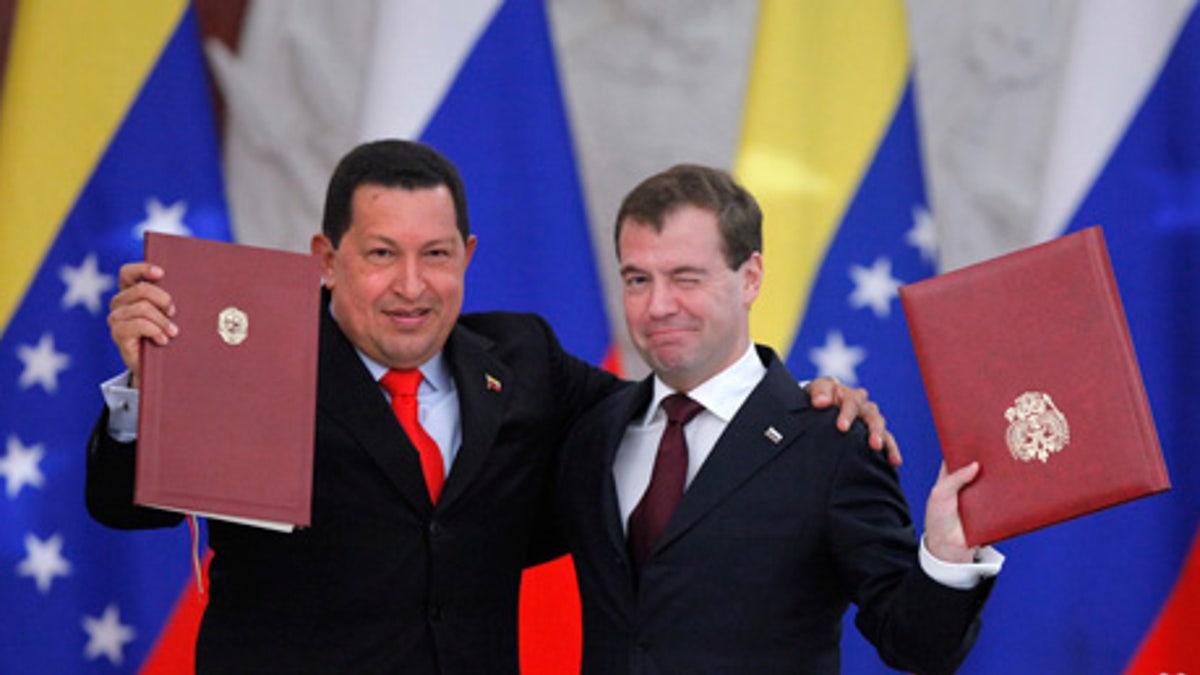
Russian President Dmitry Medvedev, right, and his Venezuelan counterpart Hugo Chavez show signed documents during their meeting in Moscow, Russia, Friday, Oct. 15, 2010. Chavez reached a deal with Russia on Friday to build the South American country's first nuclear plant and negotiated other energy agreements. Medvedev sought to preempt questions about why the Venezuela rich in oil and gas would need nuclear power by saying the deal would help Caracas reduce its dependence on global market fluctuations. (AP Photo/Alexander Zemlianichenko)
President Hugo Chávez and Russia have struck a deal to build Venezuela’s first nuclear plant, in another example of Russia’s pressing pattern of exporting their nuclear expertise.
The ITAR-Tass news agency said Russia plans to build two 1,200 megawatt nuclear reactors at the Venezuelan plant. The cost of Friday's nuclear deal wasn't immediately announced.
Russia has just completed Iran's first nuclear power plant and recently reached new deals to build nuclear reactors in China and Turkey. It's talking with Indian officials about building a dozen of nuclear reactors there and also wants to build a nuclear reactor in the Czech Republic.
Chávez said Venezuela wants to reduce its dependence on oil and gas. "Strategic cooperation with Russia gives my country a huge advantage," he said. According to CIA estimates in 2009, Venezuela ranks number 10 in the world in oil exports.
Russian President Dmitry Medvedev sought to pre-empt questions about why Venezuela would need nuclear power by saying the deal would help Caracas reduce its dependence on global market fluctuations.
"I don't know who will shudder at this," Medvedev said at a news conference after the signing. "The president (of Venezuela) said there will be nations that will have different emotions about that, but I would like to emphasize that our intentions are absolutely pure and open: We want our partner Venezuela to have a full range of energy possibilities."
The Venezuelan leader has grown close to Russia, Iran and China while assailing U.S. policies, and his rhetoric about the need for a "multi-polar world" has resonated in Moscow.
"Russia and Venezuela staunchly support the creation of modern and fair world order, so that our future doesn't depend on the will and the liking of just one country, its welfare and mood," Medvedev said in a veiled reference to the United States.
Chávez defends Iran's nuclear program, saying he is sure the country isn't building nuclear weapons. Chávez says countries like his and Iran have a right to develop atomic energy to expand their energy options.
"This is something that we will watch very closely," U.S. State Department spokesman P.J. Crowley said Friday. "The last thing we need to do is see technology migrate to countries or groups that should not have that technology."
Chávez' nuclear ambitions appear to be one more way for him to thumb his nose at the U.S. It's unclear how much money he is prepared to commit to the atomic program, or how quickly he could move to build a reactor.
Chávez met with Prime Minister Vladimir Putin later Friday. Putin said a delivery of 35 sophisticated tanks would soon be made, Russian agencies reported. There was no elaboration. State news agency RIA Novosti reported that Venezuela has since 2005 spent $4 billion on Russian arms, including helicopters, warplanes and Kalashnikov assault rifles.
True to his flamboyant style, meanwhile, Chávez praised the Soviet Union and presented Medvedev with several bars of dark chocolate and cans of banana confiture and cocoa powder as the two leaders sat facing reporter's questions.
Russian companies are involved in exploring Venezuela's shelf for oil and gas, but Putin's deputy in charge of energy, Igor Sechin, said their efforts have been unsuccessful so far.
Russian state-controlled gas monopoly Gazprom spent $300 million drilling the first borehole, but found no gas there, Sechin said, according to news reports. Gazprom is exploring Urumaco 1 and Urumaco 2 blocks in the Gulf of Venezuela, but Sechin did not specify which of them proved to contain no gas.
Sechin also said that Venezuela agreed that Gazprom should be given another sector to try its luck there.
Chávez's government has bought more than $4 billion in Russian weapons since 2005, including fighter jets, helicopters and 100,000 Kalashnikov rifles. New weapons deals have been under discussion, but no new agreements were announced Friday.
Russia and Venezuela also have launched a joint business to tap vast oil deposits in eastern Venezuela.
The Associated Press contributed to this article.
